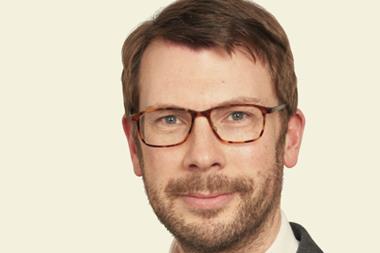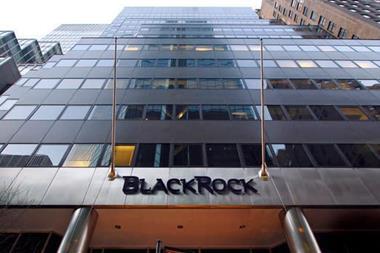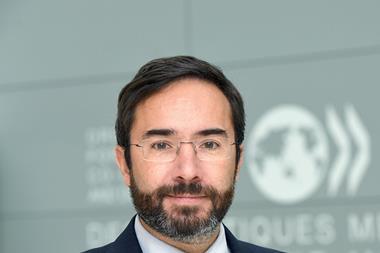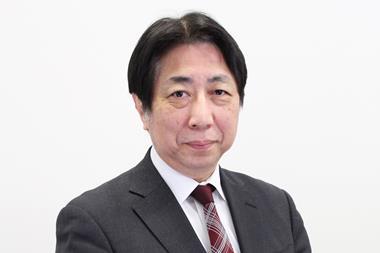The founder of $8.7trn (€7.2trn) asset manager BlackRock told the OECD’s Blended Finance Week and Impact event that the transition to a net-zero carbon global economy could not be achieved solely by action from public companies.
Larry Fink, chief executive officer of BlackRock, said: “This has to be done in concert with government. It can’t just be done by capitalism – we can only play a small role in the totality of this.”
In a session entitled ‘The Pathway to the Net-Zero Economy’ at the digital event, he said: “If we’re going to have a world that’s going to be net-zero carbon and temperatures only go up one and half degrees, it can’t be just though public companies.
“We have to implore society to make these changes, we need cities and municipalities to be responsible, we need private companies – every private company – to have the same responsibility,” Fink said.
The current narrative in the climate debate was all about the role of public companies, he said, but the change needed to come from governments of countries around the world.
“And here’s the problem – I hear the words but I don’t see the action at all, and the amount of duplicity we see is pretty large,” he said.
Public companies were seeing the pressure and selling their dirtiest carbon businesses to private companies, Fink said – a transfer he said did not change carbon levels overall.
What was really required to raise the money needed to fight climate change was a very large intergovernmental platform, he said, with states standing for first losses. This could leverage trillions of dollars of private sector investment, according to Fink.
He also bemoaned the lack of a proper taxonomy for green and sustainable investments in the US, which was an obstacle to investment in this area, because fiduciary managers feared exposure to potential lawsuits without such official definitions.
Fink, who described himself as an environmentalist but also a capitalist, said that during the pandemic, his firm had started witnessing very large inflows into more and more of its sustainable portfolios.
“I think the existential risk of the pandemic actually enlightened the existential risk of climate change to the health of the planet,” he said.
The CEO repeated his call for there to be just one global standard for sustainable accounting in 2021, and said data gathered according to this would allow the creation of customised portfolios that closely tracked indices.
“If we then move the trillions of dollars of money away from traditional indexes into these more sustainable or ESG-based indexes, that’s going to shape finance in a substantial way,” he said.
Companies that were more focused on sustainability were already trading at higher price-earnings ratios, he said.
“In every industry we’re starting to see this reallocation of capital – we’re going to see a very substantial reallocation of capital,” Fink predicted.
Investors face key challenges to drive capital towards sustainable goals
A number of stumbling blocks lay in the way of growing the volume of private capital channelled towards development and climate goals, according to panellists speaking at the blended finance and impact conference organized by the OECD.
The main challenge in the effort to push for the adoption of standards on sustainable development goals (SDGs) stems from the fact that “sustainability and impact are still not integrated into mainstream investment decision-making,” said Elizabeth Boggs Davidsen, director of SDG Impact.
Only a minor fraction of global assets under management is allocated to sustainability or impact investing, and accountability measures are only limitedly integrated in governance practices, she added.
Managing and measuring impact is essential to drive capital “where it is needed” and support “better decision-making” processes, she said, adding that for this reason SDG Impact has designed standards for bond issuers, private equity, enterprises and donors.
Organizations can use the standards as a “self-assessment tool” to spot areas of improvements, she explained.
The forthcoming OECD Impact Standards for Financing Sustainable Development (IS-FSD) would signal to the market a “commitment to invest and operate in line with best practices”, Boggs Davidsen said.
SDG Impact, a United Nations Development Programme (UNPD) initiative focused on mobilising private sector capital to achieve SDGs, has been working over the last few years to eliminate barriers that investors are facing when they want to allocate capital towards SDGs, the director said.
It has spent time to survey investors to understand why so little of the investment capital is allocated towards the achievement of the goals, she added.
It found out that investors find it difficult to translate an interest in SDG investment into action. As a result, investments labelled as SDG-focused lack robust accountability or impact management for outcomes, Boggs Davidsen said.
Nerea Craviotto, senior policy and advocacy officer at Eurodad, underlined that the private sector can play a positive role to reach SDGs, but standards are important to reinforce transparency and accountability of private sector initiatives.
Impact standards may contribute to transparency and accountability beyond the development finance community and by “challenging the concept” of commercial confidentiality, Craviotto said.
“Our expectation is that reporting on how you measure and manage impact should not be confidential,” added Boggs Davidsen.
Standards in practice
For Maria Teresa Zappia, deputy CEO, chief impact and blended finance officer at asset management firm BlueOrchard, it is “extremity important that standards are effectively building up on best practices.”
BlueOrchard has a blended finance portfolio, with “very private sector oriented funds and strategies,” she said. It has developed a new impact management framework in line with UNDP and OECD standards.
“For us it is crucial that these standards are not only for a small club of development-oriented institutions but become mainstream for institutional investors”
Maria Teresa Zappia, deputy CEO, BlueOrchard
“For us it is crucial that these standards are not only for a small club of development-oriented institutions but become mainstream for institutional investors,” she said, adding that transparency through “external independent verification” mechanisms works.
BlueOrchard has conducted an external assessment of its flagship fund on the operating principle of impact management: “This has given us a great opportunity to go back to our own investment team and investors to say that we need additional steps to be fully aligned and how we can get there.”
Lori Leonard, senior director development impact at the U.S. International Development Finance Corporation (DFC), said the government agency has developed standards to assess the impact for each project based on economic growth, or the scale of impact, inclusion of the underrepresented population and innovation.
DFC monitors the environment and social performance of investments based on the standards by using an IQ (Impact Quotient).
It “greatly benefitted” from a participatory process to design the IQ, she said, adding that the COVID-19 pandemic has forced the agency to pivot from an approach focused on growth to impact.
IPE is the 2021 Blended Finance and Impact Week Media Partner.











